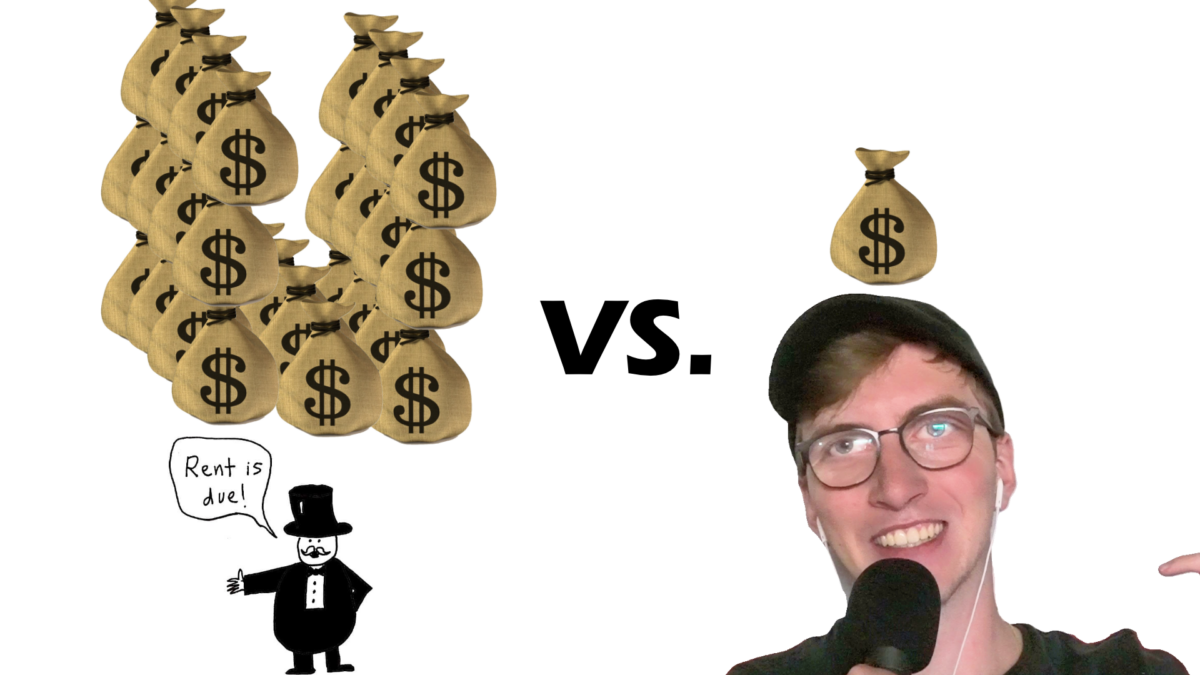Update Dec 14, 2024: Added Newsletter Email Archive at End of Post.
I wanted to talk about the ever popular debate on renting vs. owning with a focus on how the finances pencil out at this moment in time, and which option makes more sense from a Return on Investment (ROI) perspective. Toronto is a notoriously expensive housing market, especially when to comes to ownership, and renting often times appears more affordable at a glance. For the same space in Toronto it is often much cheaper to rent than it is to own (although this gap has narrowed with increasing rents and a temporarily stable housing market), and this is true across many major cities in Canada. On the face of it most people would think, “I’m getting better bang for my buck renting! Why would I ever bother purchasing?” This is somewhat shortsighted in my view and I think many people do not run the numbers on why homeownership over the long term is a more beneficial route financially (plus having the freedom to do with the property as you wish and not having a landlord). There are many very important factors that people forget to include in their renting equation which I am going to be calling the 4 horsemen of real estate ownership.
There are a few reasons why people might be biased towards viewing renting as the better option in the short term. Firstly, it can be difficult to predict prices and appreciation in the short term. For example, if you purchased a home in 1990, it would have taken about 10 years for your home price to recover from the housing market lull. If you purchased a home in early 2022, the value of your home in the current market (February 2024) is likely below what it was in 2022 and may be for another 2-3 years until those prices come back. This is partly why if you look up renting vs. owning you will often notice that ownership becomes more beneficial the more long-term you plan to hold onto the real estate. Often times if you plan to stay somewhere short-term it may actually be more beneficial to rent. I always lean towards the side of ownership when possible because there are ways to own and manage property even if you are out of province or out of country. In many cities you also have various options whether that is renting your property short-term or long-term. If you can afford to stomach a month or two of rental vacancies, you will almost always come out ahead in a high demand real estate market.
I would encourage any young person to try to enter the property ladder as soon as possible, and I’m not just saying this because I have my real estate license. I have held this belief well before I had my license. Allow me explain why I think home ownership is so benificial with some data you may find interesting. According to Statistics Canada, in 2019 the average renter had a net worth of $24,000. You might be saying, “well that makes sense, it could be a demographics thing where younger people tend to rent and some people just can’t afford to save for a home.” According to the same study, the average homeowner, on the other hand, had a net worth of $685,400, or 28 times higher. There may be some truth to the demographics of younger renters and older owners, but I believe it’s more of an education and discipline problem. So allow me to explain why this gap is so massive.
The first reason deals somewhat with human nature, most people are not savers by habit, and our 6% national savings rate proves this, in the US it’s even worse at 3.7%. For people who are not the pro-active and disciplined type, “spending” money on a mortgage can actually turn into “investing” money into real estate. Paying down a mortgage becomes a “forced savings plan” for the average person. Furthermore, many people will lack the discipline it takes to budget and save 20% or more over a number of years for a down payment. It takes a different kind of mentality and work ethic compared to simply paying rent and neglecting to find ways to save some extra money. You might have to find a place that is not as nice and therefore cheaper, you might need a second job to squirrel away all the extra cash, and you may have to skip out on a few vacations. Many people are not willing to sacrifice in order to save a down payment or they make poor financial decisions taking on debt they should not have before they even think about saving.
Luckily, not everyone is a financial mess. For people who are savers they may just prefer renting for one reason or another, or have never been shown the numbers in order to pull the trigger on home ownership. So for these people let me begin by stating that the returns on real estate (can) surpass the stock market due to a combination of reasons. Being a home owner has almost a quadruple benefit compared to renting or simply investing the equivalent which I will explain next.
Firstly, as a homeowner you get to feel the joy (or pain) of paying your own mortgage rather than paying your landlords mortgage. From a selfish point of view, it’s nice to know you’re paying into something you own rather than something someone else owns. Down the line maybe you get a tenant of your own and have them help out with your mortgage, that is known in the business as Cash Flow. Often times even if a home is “negatively cash flowing” (i.e. costs you money every month to “operate”), the other three benefits can hugely outweigh this.
Secondly, every month a portion of your mortgage payment goes to interest and a portion goes to principal (i.e. the original loan amount). The part of each payment which goes towards principal is known as principal pay down, which becomes “equity” in your home. For example, if you purchased a $1 million home with a 20% down payment, immediately out of the gate you have approximately $200,000 of home equity and the other 80% is a loan. Lets say your mortgage rate in present day (February 2024) is 5.29% fixed for 5 years, with a 25-year amortization. By 2029, or the end of the first 5 year term, you will have paid down approximately $88,755 in principal and $198,392 in interest. In this case you now have approximately $288,775 in home equity, before factoring in appreciation. You might look at this and say, “hey! I just paid $200,000 in interest! That’s crazy, what a waste of money!” This is often where people forget that homes tend to appreciate in value over the long term. The value of your $1,000,000 asset likely increased to beyond $1,000,000. Therefore the equity in the home has increased, but the loan value DECREASES at the same time thanks to your principal pay down. Over a long time horizon these two lines diverge and what’s left in the middle is (often significant) home equity.
Thirdly, the GTA over the last 40 years has appreciated at approximately 6.7% per year (in the 10 years prior to 2020 it was closer to 10% appreciation due to continually decreasing interest rates, we likely won’t see that same type of growth again). Factoring this 6.7% appreciation into the equation, in 5 years the $1,000,000 home might now be worth $1,383,000. That’s an ADDITIONAL $383,000 of home equity. Combining the original $200,000 down, the $88,775 principal pay-down, AND the $383,000 appreciation, you now have $671,775 in home equity! If we take the TOTAL return on investment between principal pay down and appreciation, in just 5 years the initial $200,000 has grown by 235%! Even if you subtract the interest you paid over the loan term you are still sitting at a new net value of around $471,000, which is still over 100% ROI in 5 years. If you took that initial $200,000 and put it in the stock market at an average 8% return every year you would have $293,865 in 5 years. Which is not even 50% of the total home equity (i.e. $671,775).
Finally, you also have the ability to create “forced appreciation” by doing some simple improvements to the property, or dividing a property into 2 or more rental units to add value from an income generation perspective. There are a few well known improvements that can significantly increase the value of your property on the open market, and if you DIY it on the cheap you can add a ton of value while saving a good portion of the labour cost. That being said PLEASE hire someone if you’re not construction savvy, a hack job could actually cost you money in materials and hurt the value of your property. If done right, by not overspending or doing a poor job, this fourth horseman of real estate ownership can help send your return on investment even higher than I outlined above.
All of the reasons listed here prove why real estate ownership can be so powerful as a wealth building tool and why the average home owner has a net worth more than 28 times higher than a renter. Many people do not take the time to do the math on real estate ownership, or might not be aware of all the ways that owning real estate provides an amazing return on their investment. Naysayers might argue that the return is not guaranteed, well, neither is the stock market or pretty much anything else you invest in. However, real estate has the benefit of being a hard tangible asset compared to an intangible piece of paper (stock certificate). There is risk to any investment, your home could theoretically blow away or burn down. But you can mitigate this with insurance. Overall, you can make a good amount of money in real estate when you purchase at the right price. If you take the example about further you might also be able to see how owning multiple real estate investments can compound your wealth even faster, and it explains why many people who are well-off have a significant stake in real estate. Even if your home appreciates at a much slower rate than the one I present here, you are likely to come out ahead of the average stock market investor and well ahead of the average renter. I hope that after reading this you think about breaking into the real estate market sooner than later and begin to benefit from the 4 horsemen of real estate ownership.
All the best,
Oliver
P.S. When you sell a primary residence your capital gains are tax free, in Canada. Also, you can deduct mortgage interest from your taxes on an investment property and you can benefit from depreciation around 4% per year. I’ll cover these tips and more in later articles. The benefits to real estate as a tool for investment and tax deferral and wealth building is bar none in my opinion.
Newsletter #8: Why Owners are 28x Wealthier Than Renters, Real Estate News

This Weeks Blog Post:
Why Owners are 28x Wealthier Than Renters:
- In this blog I show the numbers behind why home ownership can be so beneficial to growing wealth
- I talk about the 4 different ways that real estate assets grow.
- ROI of 235% over 5 years
Read the full blog post here: https://oliverfoote.ca/2024/02/18/why-owners-are-28x-wealthier-than-renters/
Housing News:
- 5-yr bond rate is ticking up slowly hitting 3.67%, some banks are continuing to offer declining mortgage rates.
- TRREB market stats for January 2024 showed a decline in inventory across the GTA and a small uptick in prices from December. This is expected as December is seasonally the slowest month due to holidays. But there is indication activity will continue to pick up into the spring, especially if the Bank of Canada cuts interest rates.
Market Performance as of close Friday Feb 16, 2024:
S&P 500: 5,005.57 (+5.54% YTD)
NASDAQ: 15,775.65 (+6.84% YTD)
S&P/TSX Composite 21,255.61: (+1.84% YTD)
Canada CPI Inflation Dec 2023: 3.4% (0.3% Increase from Nov 2023)
Current BoC Benchmark Interest Rate: 5% NC
Current Prime Lending Rate: 7.2% NC
Unemployment Rate Dec 2023: 5.8% NC
Hope you have an amazing week! Chat soon!
Best regards, Oliver Foote

